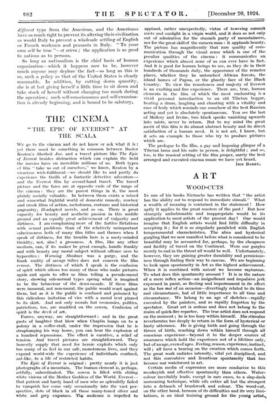THE CINEMA
"THE EPIC OF EVEREST" AT THE SCALA
WE go to the cinema and do not know or ask what it is : vet there must be something in common between Buster Keaton's Sherlock Jar. and a travel picture like The Epic of Everest besides distraction which can explain the hold the movies have on incredible millions of us. Both types of film take us out of ourselves," we know, Keaton by a vicarious wish-fulfilmentāwe should like to and partly do experience the thrills of a fantastic detective adventureā and the Everest film by second-hand travel. The travel picture and the farce are at opposite ends of the range of the cinema : they are the purest things in it, the most plainly socially valuable. In between them exists a mixed and somewhat frightful world of domestic comedy, cowboy and crook films of action, melodrama, costume and historical pageantry, ill-adapted novels, and so on. There is great capacity for beauty and aesthetic passion in this middle ground and an equally great achievement of vulgarity and dirtiness. I am complaining more of the furtive flirtations with sexual problems than of the relatively unimportant salaciousness both of many film titles and themes when I speak of dirtiness, for the trouble here is a nasty-minded timidity, not, alas I a grossness. A film, like any other medium, can, if its maker be great enough, handle frankly and with beauty any moral subject without offence save to hypocrites : Warning Shadows was a purge, and the frank nudity of savage tribes does not concern the film censor. The dirtiness of which I speak is the confusion of spirit which allows too many of those who make pictures again and again to offer us films telling a pseudo-moral story, showing sub-normal types apeing what is imagined to be the behaviour of the demi-monde. If these films were immoral, not non-moral, the public would react against them, but as it is the public is confused and poisoned by this ridiculous imitation of vice with a moral text pinned to its skirt. And not only morals but economics, politics, patriotism, too, are muddied on the screen. Confusion of spirit is the devil of art.
Farces, anyway, are straightforward ; and in the great gusts of laughter that blow when Chaplin hangs. on to a polony in a coffee-stall, under the impression that he is straphanging his way home, you can hear the explosion of a hundred repressions. The effect is curative, a relief of tension. And -travel pictures are straightforward. They honestly supply that need for heroic exploits which only too many of us feel in our safe, monotonous lives, and they expand world-wide the experience of individuals confined, ant-like, to a life of restricted habits.
The Epic of Everest is original : pretty nearly it is just photographs of a mountain. The human element is, perhaps, artfully, subordinated. The screen is filled with sliding white visions of the Mother Goddess of the World; Everestā that patient and hardy band of men who so splendidly failed to vanquish her come only occasionally into the vast per- spective, dots of black in all those many-toned silver and white and grey ā¢ expanses. Ths audience is impelled to applaud, rather unexpectedly, vistas of towering summit mists and sunlight in a virgin world, and it does so not only out of admiration for the staunch party of mountaineers, nor for the great skill of the camera man : it applauds beauty. The picture has magnificently that rare quality of com- munication through the visual sense which is one of the peculiar qualities of the cinema : it communicates an experience which almost none of us can ever have in fact., And it is good for human beings to see, as they do in their hundreds of thousands daily, the appearance of the remoter places, whether they be untouched African forests, the island homes of Papua, or the ghastly face of the Black Country. To view the remoteness and majesty of Everest is an exalting and fine experience. There are, true, human elements in the film of which the most enchanting is a vivid personal introduction to an old Tibetan beggar, beating a drum, laughing and chanting with a vitality and ease of body which reminds one somehow of the best Russian acting and yet is absolutely spontaneous. You see the last of Mallory and Irvine, two black specks vanishing upwards into mists, never to return. But to my mind the great merit of this film is its almost abstract beauty and its direct satisfaction of a human need. It is not art, I know, but it sets an example to those who try to produce pictures which are.
The prologue to the film, a gay and imposing glimpse of a Tibetan lama and his suite in person, is delightful ; and so, too, is the musical setting of the film proper, surely the best arranged and executed cinema music we have yet heard.
IRIS BARRY.










































 Previous page
Previous page